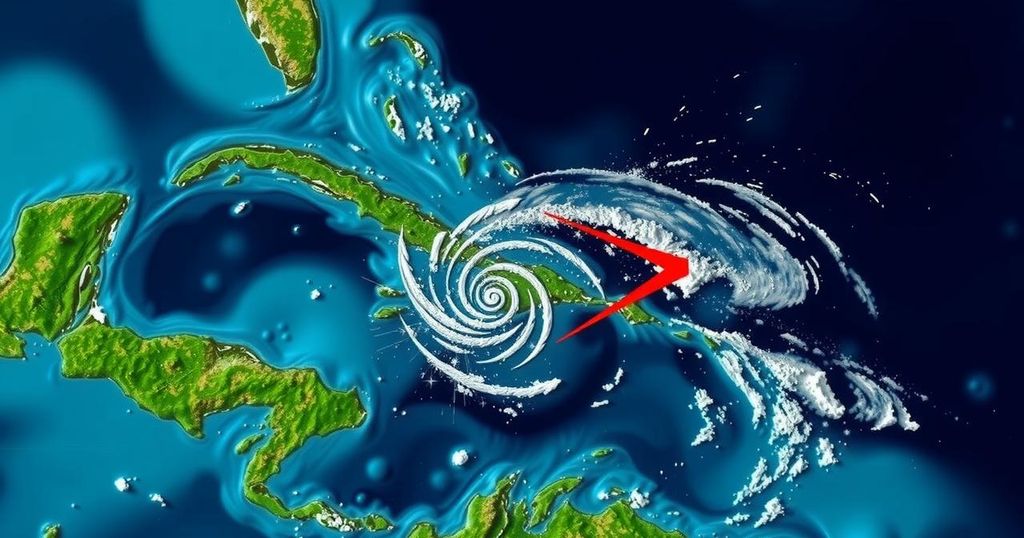Tropical Storm Oscar has transitioned toward the Bahamas after striking Cuba as a Category 1 hurricane, resulting in at least six deaths due to extensive rainfall. With winds of 40 mph, Oscar is expected to bring significant rainfall, leading to potential flooding in the islands. The storm is historically recognized as the smallest recorded hurricane. Concurrently, Kristy is developing into a hurricane in the Pacific.
Tropical Storm Oscar progressed toward the Bahamas on Tuesday after striking Cuba as a Category 1 hurricane, resulting in at least six fatalities due to its intense rainfall. By Tuesday morning, the storm was situated 45 miles south-southeast of Long Island in the Bahamas, exhibiting sustained winds of 40 miles per hour and propelling north-northeast at a velocity of 12 miles per hour, as reported by the National Hurricane Center in Miami. At this juncture, the center characterized Oscar as barely a tropical storm. The storm is projected to release up to 5 inches of rain in the southeastern Bahamas, with localized areas potentially receiving up to 8 inches. A tropical storm warning remains in effect for central and southeastern Bahamas. Notably, Oscar has made history; it is recorded as the smallest hurricane, with a wind field extending only about 6 miles across. Its unexpected transition into a hurricane took many by surprise, making landfall on Grand Inagua Island, Bahamas, on Saturday, and a subsequent landfall in eastern Cuba late Sunday. Michael Lowry, a hurricane specialist, remarked, “It’s not often we see a colossal failure in hurricane forecasting,” acknowledging that no predictive models had anticipated Oscar’s intensification into a hurricane. In Cuba, Oscar unleashed approximately 15 inches of rain in certain eastern regions, prompting warnings of severe flooding and potential landslides. The six casualties were reported in Guantánamo. The storm’s onset coincided with Cuba facing challenges in recovering from a significant blackout that incited minor protests and stern government advisories against unrest. Oscar stands as the 15th named storm and the 10th hurricane of the 2023 Atlantic hurricane season, which runs from June 1 to November 30. The National Oceanic and Atmospheric Administration has forecasted an above-average hurricane season, anticipating 17 to 25 named storms, including four to seven major hurricanes, due to record-high ocean temperatures. In the Pacific, Tropical Storm Kristy was noted churning over open waters, positioned 375 miles west-southwest of Acapulco, with maximum sustained winds of 50 miles per hour and a west-northwest trajectory at 15 miles per hour, with expectations of it escalating into a hurricane by Tuesday night.
The Atlantic hurricane season, spanning from June to November, has witnessed an increased intensity this year, attributed to rising sea temperatures. Tropical Storm Oscar represents a significant weather event during this season, having made history as the smallest hurricane recorded. The storm’s unpredictable behavior led to an unexpected landfall on Cuba, causing fatalities and extensive rainfall which exacerbated existing power supply issues on the island. The National Hurricane Center continuously tracks and forecasts tropical cyclone activities and provides critical information regarding storm developments and warnings to affected regions, particularly in areas like the Bahamas that are vulnerable to these storms. Enhanced understanding of these phenomena is essential as they directly impact the socio-economic conditions in affected areas, as well as response strategies undertaken by governments and aid agencies.
In conclusion, Tropical Storm Oscar’s trajectory towards the Bahamas following its hurricane landfall in Cuba highlights the tumultuous nature of the Atlantic hurricane season, characterized by unexpected storm behaviors and severe consequences for affected regions. The casualties in Cuba underscore the necessity of effective storm forecasting and preparedness strategies, especially as the effects of climate change continue to escalate. The National Oceanic and Atmospheric Administration’s forecasts suggest that the current season may yield further storms, necessitating vigilant monitoring and proactive measures to safeguard communities.
Original Source: www.washingtontimes.com






